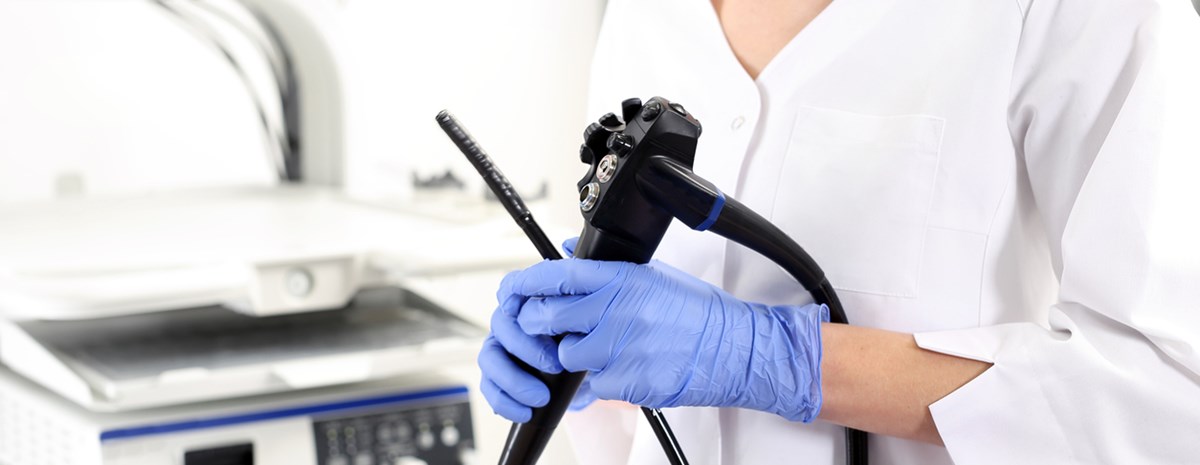1. What is upper GI endoscopy?
2. What happens during upper GI endoscopy
3. How long does the upper GI endoscopy procedure take?
4. After upper GI endoscopy
5. Upper GI endoscopy under general anaesthesia
6. How to prepare for the upper GI endoscopy procedure?
7. Upper GI endoscopy: the fee
8. Where is upper GI endoscopy offered?
What is upper GI endoscopy (gastroscopy)?
Upper GI endoscopy is an examination that allows the doctor to look directly at the mucosa of the oesophagus, stomach and duodenum. The examination is carried out using an endoscope, a flexible tube with vision channels that allow images from the inside of the digestive tract to be displayed on a colour monitor. An important advantage of endoscopy, apart from the assessment of the condition of the mucosa, is the possibility of collecting tissue samples from lesions for histopathological examination.
What happens during upper GI endoscopy
Before inserting the endoscope, the nurse anaesthetises the throat with a suitable anaesthetic spray. Alleviating the uncomfortable symptoms that occur during the examination makes it easier for the patient to focus on calm and deep breathing. The correct breathing rhythm makes the examination easier to bear for the patient and allows the doctor to examine the digestive tract more thoroughly.
How long does the upper GI endoscopy procedure take?
Upper GI endoscopy is a short examination. It takes about 5–15 minutes to complete.
After upper GI endoscopy
- The patient should not eat, drink or smoke for two hours after the examination.
- If the patient has been given anaesthetics and/or sleeping pills, driving is contraindicated for several hours after the examination.
Upper GI endoscopy under general anaesthesia: "I am asleep and I feel nothing"
At Medicover Hospital, it is possible to undergo upper GI endoscopy under brief general anaesthesia.
The patient must give written consent for general anaesthesia. The preparation for the examination is the same. Before the examination, the anaesthetist assesses whether the patient has any contraindications to general anaesthesia and informs the patient of all the details of the anaesthesia.
After an intravenous injection of a sleep-inducing agent, the patient falls asleep for a few minutes or so and wakes up at the end of the examination.
Once the examination is over, the patient must not eat anything until the time specified by the anaesthetist. The patient may only leave the hospital under adult supervision no sooner than one hour after the end of anaesthesia. The patient should not drive for up to 24 hours after anaesthesia, depending on the decision of the anaesthetist.
How to prepare for the upper GI endoscopy procedure?
- The patient should not eat anything for at least 8 hours before the examination, the last meal before the examination should be easy to digest and the patient should not eat too much during that meal.
- The patient should not drink, smoke or chew gum for at least 4 hours before the examination.
- In patients at increased risk, including those with artificial heart valves, a history of endocarditis, a vascular prosthesis or a significantly reduced white blood cell count, antibiotics may be required immediately prior to the examination. It is up to the referring doctor to decide whether and how to administer the antibiotic.
- The examination may not be performed without the patient's written consent.
- Dentures must be removed before the examination.
- Additional tests are not necessary (unless the doctor advises otherwise).
Upper GI Endoscopy Warsaw: The fee
You can also read about the available tests and examinations at Medicover Hospital on the website Diagnostic Centre.
At the Medicover Hospital, upper GI endoscopy is performed by experienced endoscopy specialists:
- Wojciech Kosmala MD, Endoscopy Suite Co-Ordinator, gastroenterologist
- Anna Cybulska MD PhD, gastroenterologist
- Monika Gapys, MD – gastroenterologist, general practitioner
Contact us to learn more about our offer and get more details
Call 500 900 900
or fill in the form – and we will call you back.
Szpital Medicover
Aleja Rzeczypospolitej 5
02-972 Warszawa


